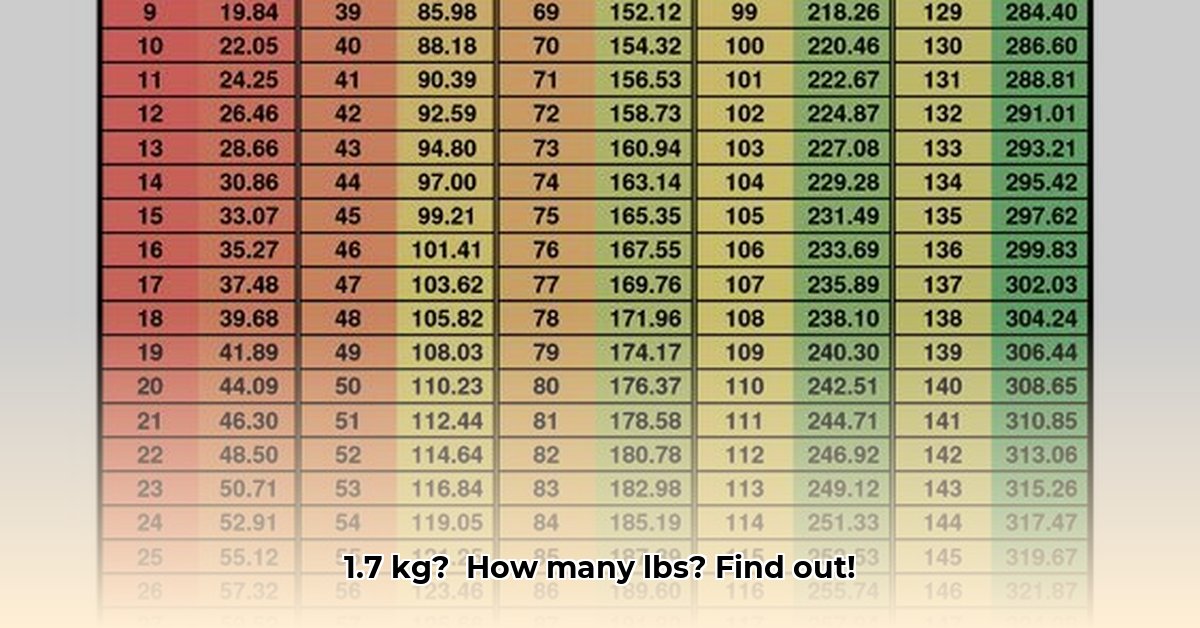1.7 kg equals 3.75 lbs. (Large, bold font)
This is a rounded value, suitable for most everyday purposes. The precise conversion is 3.747858… lbs.
Quick Conversion & Formulas
- Precise Formula: pounds = kilograms / 0.45359237
- Approximate Formula: pounds ≈ kilograms * 2.20462
- Example: Using the precise formula, 1.7 kg / 0.45359237 = 3.747858… lbs
Defining Units and Understanding the Difference
-
What is a kilogram (kg)? A kilogram is the base unit of mass in the International System of Units (SI). It represents the amount of matter in an object and is independent of gravity. One kilogram is roughly equivalent to the mass of one liter of water under standard conditions. Current research in metrology continually refines the definition of the kilogram for greater precision.
-
What is a pound (lb)? A pound is a unit of mass (and conventionally, weight) in the imperial system, commonly used in the United States. While often used interchangeably with weight in everyday language, a pound technically refers to mass in the same way a kilogram does, though its value is defined relative to the kilogram.
Conversion Table & Visualization
| Kilograms (kg) | Pounds (lbs) | Example |
|---|---|---|
| 1.5 | 3.31 | A large cantaloupe |
| 1.6 | 3.53 | A standard bag of sugar |
| 1.7 | 3.75 | A small bag of potatoes |
| 1.8 | 3.97 | A medium-sized butternut squash |
| 1.9 | 4.19 | A large pineapple |
Visualizing 1.7 kg can be helpful. Imagine nearly two liter bottles of water. That’s about 1.7 kg. In pounds, visualize a large bag of coffee beans or a small bowling ball – that’s around 3.75 lbs.
Practical Applications
Knowing how to convert kilograms to pounds is essential in a variety of situations:
- Culinary Arts: Many international recipes list ingredients in kilograms. Accurate conversions ensure proper ingredient ratios when using recipes from various sources.
- International Shipping: Shipping costs often depend on weight, and international shipping frequently requires conversions between metric and imperial units.
- Travel: Airline baggage allowances are typically given in both kilograms and pounds. Understanding the conversion helps travelers avoid overweight baggage fees.
- Science & Engineering: Many scientific and engineering calculations require precise conversions between metric and imperial units of mass for accuracy.
- Commerce: Products sold internationally may have their weight listed in either kilograms or pounds, depending on the target market. Understanding the conversion assists consumers in comparing products and making informed purchasing decisions.
Mass vs. Weight: A Subtle Distinction
While often used interchangeably, mass and weight are distinct concepts. Mass measures the amount of matter in an object, while weight measures the force of gravity acting upon that mass. Your mass remains constant regardless of location, but your weight would change if you traveled to the moon due to its weaker gravitational pull. This distinction is crucial in physics and engineering but rarely affects everyday conversions. Ongoing research in these fields may further refine our understanding of these concepts.
The Ever-Evolving Science of Measurement
It’s important to acknowledge that metrology, the science of measurement, is a constantly evolving field. While the conversion factors provided here are highly accurate for practical use, ongoing research likely strives for even greater precision. This suggests that our understanding of these units might be further refined in the future. For daily applications, however, the information presented here is considered reliable.
- Food Prep Lunch Box Simplifies Healthy Meals for On-the-Go Lifestyles - February 18, 2026
- Choosing the Best Meal Prep Lunch Box for Daily Use - February 17, 2026
- Sectioned Food Storage Containers Are Your New Meal Prep Lifesaver - February 16, 2026










